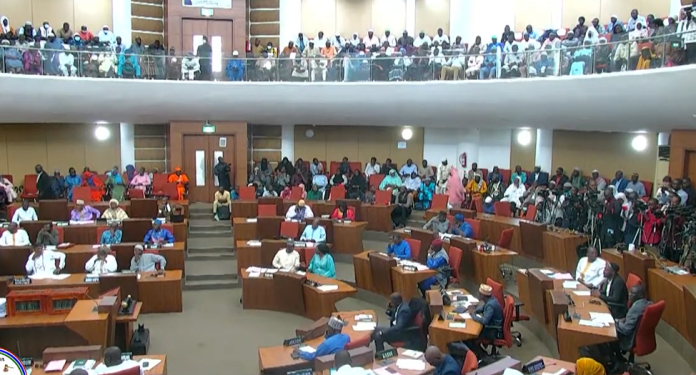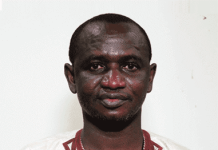By Momodou Jarju
The National Assembly of The Gambia Monday committed the Women (Amendment) Bill 2024 which seeks to repeal the ban on the practice of Female Genital Mutilation (FGM) or female circumcision, eight years after it came into force in the country.
Just like a fortnight ago, the national assembly gallery was filled to the brim. Both anti and pro FGM/ female circumcision campaigners thronged the august body to watch the country’s lawmakers deliberate on the bill before the glaring eyes of the globe.
This bill is one of the most attention-grabbing matters before the legislative body under President Adama Barrow’s regime. There is no gainsaying that its cultural, religious and human rights links caused this attention from the Gambian populace and the international bodies.
Baddibu Central lawmaker Hon. Sulayman Saho first raised the matter before his colleagues in September last year. Six months later, Foni Kansala lawmaker Hon. Almameh Gibba presented the Women (Amendment) Bill 2024 aimed at decriminalising the banning of the practice.
Ahead of Monday’s debate, civil society organizations and activists have urged the Barrow-led government to oppose the lifting of the ban on FGM. The same is also true of Islamic religious groups and leaders who clamoured for it to be repealed.
The mover of the Bill Hon. Gibba set the stage for debate when he read the bill for the second time. He said that the current ban on female circumcision is a direct violation of citizens’ rights to practice their culture and religion as guaranteed by the 1997 Constitution.
Given that The Gambia has a predominantly Muslim population; Gibba moved that any law that is inconsistent with the aspirations of the majority of the people shouldn’t be considered. He noted that the use of laws to restrict religious and cultural practices whether international or otherwise can lead to conflict.
“Interestingly, the continued existence of the ban on female circumcision and penalizing practitioners has directly contradicted the broader principles of the United Nations, which encourages, through its agencies, the preservation and practice of cultural and historical heritages,” he said.
He challenged the terminology used by anti-female circumcision movements, who label the practice as “mutilation.”
“Properly conducted circumcision, as per religious guidelines and teachings, is not and cannot be deemed mutilation. Emphasizing this distinction is crucial in addressing concerns raised by activists,” he said.
Lawmakers Debate Before Committal to Committee
After Hon. Gibba’s comments, lawmakers took turns to debate on the merits and principles of the aforementioned bill.
Lower Fulladu West lawmaker Hon. Gibbi Mballow shared his opposition to the repealing of the law banning female circumcision, saying that the girl child has gone through a lot of pain in this country which should be stopped.
“We cannot hide behind Islam. We cannot hide behind culture and put pain on our children,” he said.
Lawmaker Mballow urged his colleagues to bury the Bill 6ft deep and not even commit it to any committee stage because the matter has nothing to do with Islam, citing Islamic countries that uphold the ban on practicing FGM, including Senegal and Saudi Arabia.
“As a father I regret why I meted that pain on my daughter,” he revealed.
Kiang West and Foni Bintang Karanai lawmakers Hon. Lamin Ceesay and Hon. Bakary Badjie respectively supported the bill.
Lawmaker Ceesay said he is not going to support any act in the assembly that would arrest or execute the people who voted him into the assembly. He said any provision that discriminates against the majority of the population in a country isn’t a good law.
“If we have a law that discriminates [against] more than 75% of the population of a country, it is a bad law anywhere you go,” he said.
Lawmaker Badjie on the other hand said his constituents want to practice FGM and as such, he will support it. He said the pro-FGM Bill is in line with the values, cultures and religious principles of the population. Thus, he said, jailing people for practicing their cultural and religious beliefs ought to be stopped forthwith.
Meanwhile, the minority leader and member for Brikama North Hon. Alhagie S. Darboe proffered a national dialogue on this matter to give peace a chance, noting the sensitive nature of the matter. He urged his colleagues to refer the bill to one of the assembly committees in a bid for them to make informed decisions after consultations with various stakeholders.
Hon. Billay G. Tunkara, the majority leader and member for Kantora moved a motion, after the minority leader’s suggestion for the bill to be committed to the Assembly Business Committee to refer the bill to the relevant committee(s) who will report back to the plenary for consideration. Madi Ceesay, member for Serrekunda West, seconded the motion.
Members voted on the motion and 42 voted yes, four voted no and one abstained.
“There Is Still A Chance”
Famous Gambian activist and anti-FGM campaigner Jaha Dukureh said there is a chance that the FGM law wouldn’t be repealed.
“I would have loved to see them kill the bill. But at the same time, sending it to the committee is a chance for the Human Rights Committee, as well as the Women’s Committee and the Health Committee, to come out with evidence-based research to say why this practice is harmful,” she told journalists on the sidelines at the national assembly.
“So overall, I think this is a good thing, because one of the challenges in the Gambia is a lot of people are claiming that Gambia doesn’t practice female genital mutilation and if we take this back to the health committee and we take it to the human rights committee then we are able to present evidence that everyone can review that is from Gambians, from Gambian hospitals. So in a way I think this is good. National dialogue was necessary and I personally believe that this is good.”
Speaking further, an FGM survivor also called on civil society groups to go back into the communities and engage them with respectful conversations about why they believe the practice is wrong.
“And survivors, like myself, they need to share their experiences because I think one of the things that has been very hurtful to me is hearing people invalidate our stories and say that we are making it up, saying that we are lying, saying that Gambia doesn’t have female genital mutilation and that we are only doing this because of money. It has nothing to do with that. This is about Gambia, this is about Gambian women, this is about our future, [and’ this is about our daughters,” she said.
“FGM Ban is Giving Us Headache”
Also speaking on the sidelines, pro-FGM bill supporter Gibriel Haruna Saidy said FGM law is against Islam that’s why he is supporting its repeal. He said they are confident that the law will be repealed, saying majority of the lawmakers are Muslims and they are concerned about their religion.
“They will do and they will stand with us, Inshallah, as Muslims. And they will ever support their religion. And I’m really fully with them. And I really believe that. This bill is going to be repealed because this law is giving us a lot of headache as Muslims,” he said.
“We are the majority and they say democracy, majority carries the vote. Why [sic] you are putting a law which is preventing them to express their beliefs and their faiths?”





















